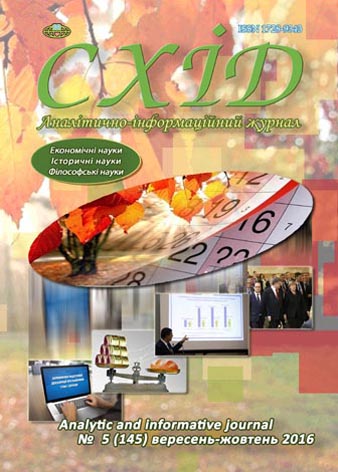Value impulses of the ecological ethics in the religious ideas
DOI:
https://doi.org/10.21847/1728-9343.2016.5(145).83812Keywords:
ecological ethics, environment, humanism, solidarity, humanistic synergy, valuesAbstract
Power, informational equipment of industrial potential of human civilization, of course, thanks to the growing scientific and technical progress. At the same time its effects often cause the technological, ecological, anthropological disasters.
All this actualize the role of ethics in its practical dimensions. It is very important to use the philosophical and heuristic potential of ethics, its sensitivity to humanistic sense of contemporary environmental and biomedical problems. Their solution depends largely the future of human life and fate of the planet. According to this factors the aim of this article is to reflect the strategy of interpretation of the relationships between man and nature in a number of world religions. Also the aim of article is to model the parameters of interfaith dialogue for the invention of effective forms of religious communities' participation in the environmental initiatives intended to the optimizing of the balance between society and the natural environment.
The novelty element of our study is that it not only covers the basic tenets of religious traditions on environmental issues, but also outlines the opportunities and heuristic potential of synergy between productive humanistic and socially relevant ideas of different faiths and philosophically-religious discourses for the invention of instruments for interdenominational cooperation in the practical environmental projects and initiatives.
Only the declarations of concern about environmental problems, of course, are not enough. Value consciousness of religious communities and individuals must be transformed into the practical sphere. It means that religious organizations should be actively involved, including their financial, intellectual and organizational forces to the real environmental projects and initiatives that have applied out and can lead to tangible results.
Many religions have the conceptual resources of a certain attitude to environmental issues. And the vector of this attitude can be returned ambivalently: either toward passivity and paralyzing the creative will of man, or in the direction of real activity-promoting. Under these conditions, the educational activities within religious communities is of paramount importance. Its key value postulate is the social and communicative harmony, health of human society and the preservation of human culture in its humane forms. Under another conditions the environmental initiatives of religions are only declaratory and little effective.
The study is implemented on the disciplinary boundaries of ethics, social philosophy and religious studies. The author uses the methodological possibilities of synergy of humanistic ideas of religious ethics concept.Downloads
References
Barbur, I. (2001), Ethics in an age of technology, Biblical theological institute, Moscow, 381 p. (rus.)
Berdiayev, N. (1931), About the destination of Man. The Essay of paradoxical ethics, Contemporary notes, Paris, 318 p. (rus.)
Berdiayev, N. (1990), The sense of history, Moscow, Mysl, 176 p. (rus.)
Bible (1993), Ukrainian Biblical Society (ukr.)
Boreyko, V. (2013), Breakthrough into the ecological ethics, Kyiv, Logos, Logos, 168 p. (rus.)
Guseva, N. (1968), Jainism, Nauka, Moscow, 126 p. (rus.)
Dwivedi, O., Silva, L. & Izzi, Din M. (1994), Ecological and ethical views of Hinduism, Buddhism and Islam, available at: http://www.ecoethics.ru/old/m2.06/x20.html (rus.)
Yefimova, L. The challenges of contemporary days and Islamic social thought in SEA, The countries of SEA and the West: plurality of forms of cooperation. The history and contemporary days,Moscow, available at: http://mgimo.ru/upload/iblock/243/243c1ccc460a3c56c55743a58aeb5903.pdf (rus.)
Zhukaliuk, N. & Liubashchenko, V. (2003), History of the Seven Day Adventists Church in Ukraine, The source of life, Kyiv, 320 p. (rus.)
Jone Paul II. (1992), The thinking about Erthly, Moscow, Novosti, 424 p. (rus.)
Lec, S. (1999), Unkempt thoughts, Moscow, Academic project, 173 p. (rus.)
Mishatkina, T., Barkovskaya, A. & Bogdanchik, N. (2008), Ecological ethics and the ecology of Man, Minsk, 43 p. (rus.)
Taqi al-Din al-Nabhani (2003), Economical system in Islam, Beirut-Leabanon, 380 p. (rus.)
Nullens, P. & Michener, R.T. (2015), The matrix of Christian Ethics. Intergrating Philosophy and moral theology in Postmodern Context, Kyiv, Knyhonosha, 304 p. (rus.)
The Pope of Rome called the desire to benefit the cause of the crisis (2011), Arguments and facts, available at: http://www.aif.ru/society/religion/262944 (rus.)
Koran (2012), King Fagd Center, Medina, 992 p. (ukr.)
The Budda’s words (2012), Moscow, Ganga, 384 p. (rus.)
Stiopin, V (2011), Civilization and culture, Saint-Petersburg Humanitarian University of Unions, Saint-Petersburg, 408 p. (rus.)
Telushkin, J (1995), Jewish world. The most important knowledge about Jewish nation, its history and religion, Moscow, Nauka, 577 p. (rus.)
Toynbee, A.J. & Ikeda, D. (2007), Choose life, Moscow, Moscow University, 448 p. (rus.)
Schweitzer, A. (1973), Culture and ethics, Moscow, Progress, 343 p. (rus.)
Shumylo, S. (2013). Ecology, Orthodoxy and Spirituality, The Orthodox observer, 21/07/2013, available at: http://pravoslavnews.com.ua/articles/ekologia_duhovmist_shumylo/ (rus.)
Downloads
Published
How to Cite
Issue
Section
License
Copyright (c) 2016 Oleksandr Brodetskyi

This work is licensed under a Creative Commons Attribution-NonCommercial-NoDerivatives 4.0 International License.
1. Authors bear responsibility for the accuracy of facts, quotations, numbers and names used.
2. Manuscripts are not sent back.
3. The publisher does not always agree with the authors' opinion.
4. The authors reserve the right to authorship of the work and pass the first publication right of this work to the journal under the terms of a Creative Commons Attribution-NonCommercial-NoDerivatives 4.0 International License. This license allows others to distribute (copy) the published work for non-commercial purposes, provided there is mandatory attribution to its authors and a link to the first publication in our journal.
5. The authors have the right to conclude separate supplement agreements that relate to non-exclusive work distribution in the form in which it has been published by the journal (for example, to upload the work to the online storage of the journal or publish it as part of a monograph), provided that the reference to the first publication of the work in this journal is included.

